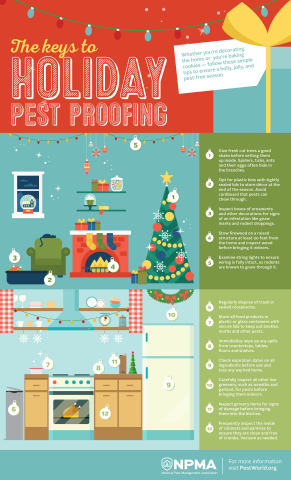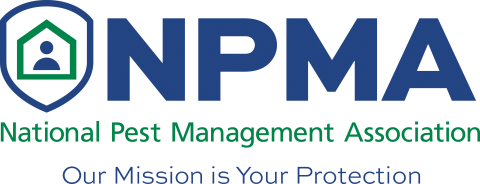FAIRFAX, Va.--(BUSINESS WIRE)--The holiday season is upon us and for many, it’s the most wonderful time of the year. While the twinkling lights and smell of homemade confections can surely put anyone in the holiday spirit, nothing can damper this cheer like finding pests lurking in the decorations. The National Pest Management Association (NPMA) is reminding homeowners to keep a watchful eye for pests while decking the halls and to take precautions to enjoy a pest-free holiday with family and friends.
Spiders, ticks and ants are unintentionally brought indoors this time of year via live greenery used to decorate the home, such as trees, wreaths and garland. Occasionally, these pests may lay eggs in the greenery, which can create a major problem for homeowners if they hatch inside the home. “To minimize the chance of an infestation, homeowners should inspect these seasonal items for evidence of pests and shake them out before bringing them inside,” noted Cindy Mannes, vice president of public affairs for NPMA.
Another way that pests are introduced into the home during the holidays is through firewood. “It’s good practice for anyone planning to enjoy their fireplace this winter to inspect all pieces of wood before carrying them into their main living space,” added Mannes. Outdoors, excess firewood should be stowed on a raised structure at least 20 feet from the home.
Boxes of ornaments and other decorations stored since last season in basements, attics and garages also provide the ideal habitat for pests, so it’s important to unpack these items outdoors and check them for signs of an infestation like gnaw marks and rodent droppings. At the end of the season, NPMA recommends storing all décor in plastic bins with tightly sealed lids to ensure pests don't become an unwelcome surprise when it's time to decorate again next year.
For more information on holiday pests, visit PestWorld.org.
About the National Pest Management Association
The NPMA, a non-profit organization with more than 7,000 members, was established in 1933 to support the pest management industry's commitment to the protection of public health, food and property. For more information, visit PestWorld.org or Like PestWorld on Facebook.




